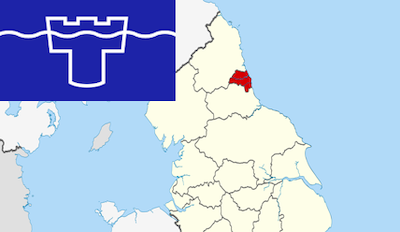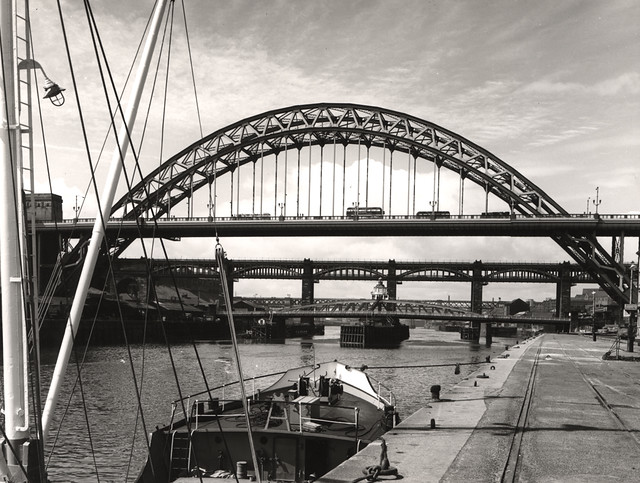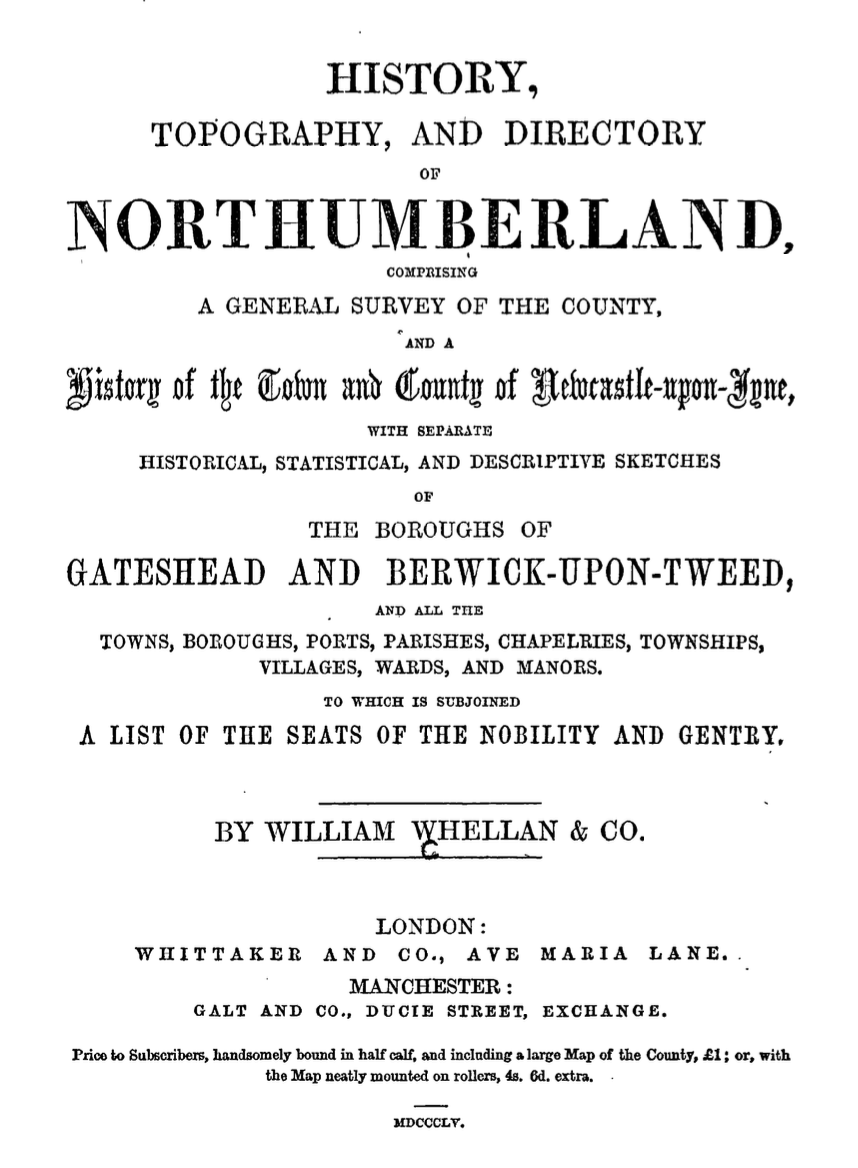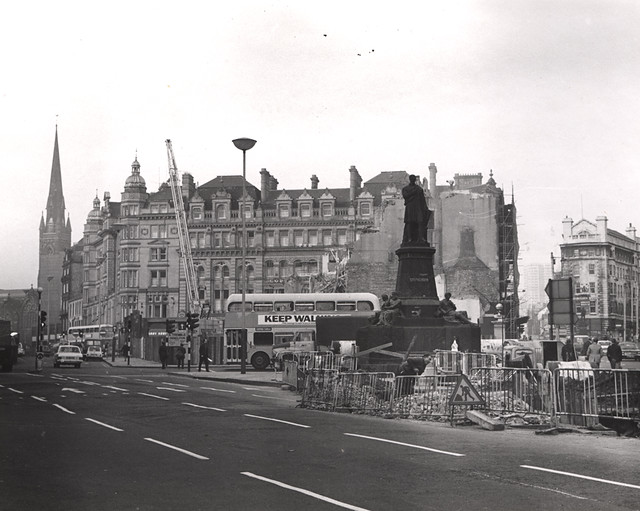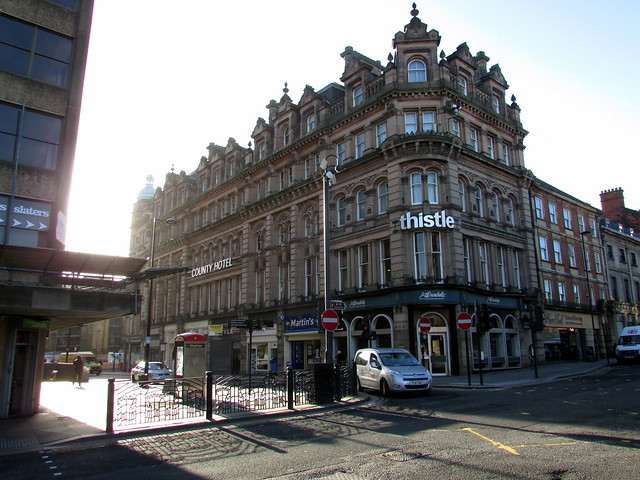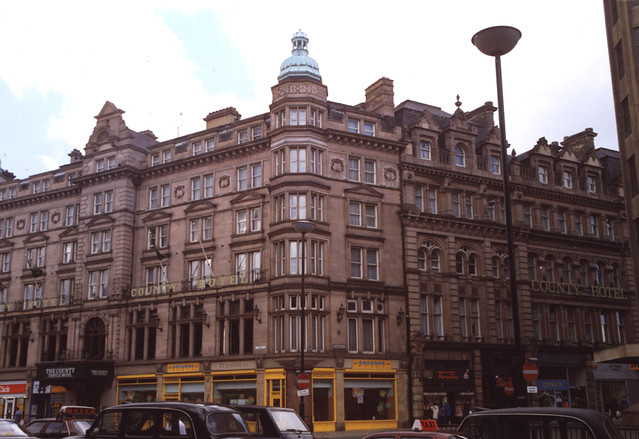Topics > Tyne and Wear > Newcastle upon Tyne > Newcastle, 1855 > Eminent Men of Newcastle, 1855
Eminent Men of Newcastle, 1855
Extract from: History, Topography, and Directory of Northumberland...Whellan, William, & Co, 1855.
WORTHTES. Amongst the eminent men who occupy niches in the Newcastle Temple of Fame, or were distinguished for their piety, literary attainments, or proficiency in the arts or sciences, and who were born or flourished here, we find the following : -
THOMAS BEWICK, the celebrated wood engraver, was born in the year 1753 at Cherryburn, near Ovingham, in this county, and manifesting at an early age a great proficiency in drawing, he was bound apprentice to Ralph Beilby, a distinguished engraver of Newcastle. He cut in wood the mathematical diagrams for Hutton's Mensuration, which was published in Newcastle in 1770; but the work which first brought him into notice was his wood-cut of "The Old Hound," which gained the prize of seven guineas from the Society of Arts in 1775. Shortly after the termination of his apprenticeship be was taken into partnership by his master, and in the year 1790 appeared his “History of Quadropeds.” This was followed by ''The British Birds,” and the "Fables of AEsop," the last of his published works. Mr. Bewick pos¬sessed a rare union of talent, being a naturalist, a draughtsman, and an engraver. He died at his house in Gateshead, on the 8th November, 1823, in the 76th year of his age.
SIR WALTER BLACKETT was born December the 29th, 1708. On the 13th of October, 1733, he was admitted to the freedom of Newcastle, and was mayor of that town in 1735, 1748, 1756, 1764, and 1771; high-sheriff of Northumberland in 1732, and M.P. for Newcastle in 1734, 1741, 1747, 1754, 1768, and for the seventh time in 1774. He was a munificent contributor to public works and private charities, and was one of the most earnest supporters of the Newcastle Infirmary at its establishment in 1751, when he subscribed £200 towards its erection, and £50 per annum in support of the institution. Five years afterwards he made another donation of £1,000. His works and charities are still the theme of common conversation. He died in London on the 14th February, 1777, in the 69th year of his age.
The REV. HENRY BOURNE, author of "Antiquitates Vulgares,"' was a native of this town. In early life he was bound apprentice to a glazier, in the Side, in Newcastle, but evincing a disposition for letters, his master cancelled the indentures, and he was again sent to school, and was admitted a sizar in Christ's College, Cambridge, in 1720. Having taken his degree, he returned to Newcastle, and was appointed curate of All Saints', where he officiated till his decease in 1733. Besides the work above mentioned he was the author of "A Treatise upon the Collects, Epistles, and Gospels of the Book of Common Prayer," in 1727 ; and "The History of Newcastle," in 1736. This last was not published till three years after the author's death.
The REV. JOHN BRAND was a resident of Newcastle, He was born on August 19th, 1744, at Washington, in the county of Durham, where his father Alexander Brand was parish clerk. On his mother's death he came to reside with his maternal uncle, Anthony Wheatley, cordwainer, residing in the Back Row, Newcastle, to whom he was bound apprentice in September, 1758. He was educated at the Grammar School, then under the able direction of the Rev. Hugh Moises, by whose interest he was sent to the University of Oxford, where he obtained the degree of B.A. Having been ordained, he became curate of Bolam in this county, and was subsequently transferred to the curacy of St. Andrew's in Newcastle. He was afterwards presented with the curacy of Cramlington, and at the time of his demise in September, 1806, he was rector of the united parishes of St. Mary at the Hill, and St. Andrew Hubbard in the city of London, and resident secretary to the Society of Antiquaries. Mr. Brand was the author of the following works, viz: - "Observations on Popular Antiquities, including the whole of Mr. Bourne's Antiquitates Vulgares, with Addenda to every chapter of that work; as also, an Appendix, containing such articles on the subject as have been omitted by that author," 8vo. ; A "History of Newcastle," and several minor publications.
VICE-ADMIRAL LORD COLLINGWOOD, was born at Newcastle, in 1750. He was the friend and confidant of the gallant Nelson, after whose fall at the battle of Trafalgar, Admiral Collingwood completed the victory in the most gallant style, for which conduct, November 24th, 1805, the freedom of the City of London and a sword valued at two hundred guineas, were voted to him. The same year, the common council of Newcastle voted him a piece of plate valued at one hundred and fifty guineas, and the master and brethren of Trinity House, presented him with the freedom of that corporation in a gold box. He also received a splendid present from the Newcastle Armed Associated Voluntary Infantry, for his meritorious conduct on the same occasion. He died off Minorca, on board the Ville de Paris, on the 7th May, 1810. His remains were interred in St. Paul's Cathedral.
JOHN SCOTT, EARL OF ELDON, High Steward of the University of Oxford, a Governor of the Charterhouse, and a member of the Privy Council, D.C.L., F.R.S., and F.S.A., was born at his father's house in Love Lane, Newcastle, on the 4th June, 1751. John, who was the youngest of the family, like his brother William, was educated at the Grammar School of Newcastle, but at an early age he quitted it for the University of Oxford, where he matriculated, at University College, on May 15th, 1766, being then in his fifteenth year. While there he received the assistance of his brother's private and public tuition, and to such good account was it turned that in July, 1767, he was elected a fellow of his college. He took the degree of B.A. in 1770, and in the following year gained the Chancellor's prize of twenty guineas, for an English essay" On the Advantages and the Disadvantages of Foreign Travel.'' In 1773, Scott was admitted a student of the Middle Temple, but as yet he resided principally at Oxford, and in order to add to his income at that time, he took part in the tuition of University College, with his brother and Mr. Fisher, afterwards the master of the Charterhouse. He also read lectures as deputy of the Vinerian Professor of Common Law, in the years 1774-1776. He then applied himself exclusively to the study of the law he was called to the bar in 1776, and within seven years after, received a silk gown. In 1783 he obtained a ,seat in parliament for Weobly, through the Lord Chancellor Thurlow's interest with Lord Wevmouth. In 1788 he was made Solicitor-general and knighted, and on the promotion of Sir Archibald Macdonald to the office of Chief Baron of the Exchequer, in February 1793, Sir John Scott was made Attorney-general. Six years afterwards he was raised to the peerage by the title of Baron Eldon, and appointed Chief Justice of the Common Pleas, and in 1801, he became Lord Chancellor of England. This important office he held till 1806, when Erskine succeeded him under the administration of "All the Talents." On the 1st. of April, 1807, he was re-appointed, and from this period he continued in office until April 30th, 1817, altogether nearly twenty-five years. On his resignation in 1827, he received from George IV, a present of a superb silver vase as a token of respect, and in 1821, on the coronation of that king, he was promoted to the dignity of Viscount Encombe and Earl of Eldon. For a few years after his resignation Lord Eldon continued to attend the House of Lords, and on important occasions he took part in the debates, occasionally with the vigour of his early days, but as old age increased, his attendance became less frequent, and domestic bereavements were added to infirmities. The loss of his favourite son in 1832, was a severe blow, and the state of his brother, Lord Stowell, was a farther most bitter affliction. At length in January, 1838, he expired from the effects of age, calmly and without pain, at his house, Hamilton Place, London, in the 87th year of his age.
THE REV. RICHARD DAWES. This distinguished scholar and critic, was born at Stapleton, in Leicestershire, and entered Emanuel College, in the University of Cambridge, in 1725. He obtained the degree of M.A. in 1733, and in 1738 was appointed head master of the Royal Grammar School, in Newcastle-upon-Tyne. He was appointed master of the Hospital of St. Mary the Virgin, in the same year. While occupying these offices, he was indefatigable in prosecuting his inquiries into the nature, peculiarities, and structure of the Greek tongue, and accordingly he published his "Miscellanea Critica" By this work he obtained a very high position among those who have contributed to the promotion of Greek learning in England. He died at Heworth Shore, on the 21st of March, 1766, aged 57 years.
CHARLES BUTTON, L.L.D., F.R.S. was born in Percy-street, Newcastle- upon-Tyne. Like many others he was entirely a self-taught mathematician. In the early part of his life he worked as a hewer in Old Long Benton Colliery, but not being able to continue at such laborious employment, he opened a school in Jesmond village, and afterwards removed to Newcastle, where he taught with great success till 1773, when he was appointed by the Board of Ordnance to the professorship of mathematics in the Royal Military Academy, Woolwich. The following year he was elected a fellow of the Royal Society. His publications were very numerous, and for a long period have occupied a very high position as mathematical treatises. He died at his house in Bedford Row, London, on the 27th January, 1823, in the 86th year of his age.
THE REV. HUGH MOISES, A.M. was for many years head master of the Royal Grammar School in this town, and justly celebrated for his laborious and successful discharge of the important duties attached to his position. Among his pupils we find the names of the Earl of Eldon, Lord Stowell, Lord Collingwood, and several other eminent persons. He resigned the mastership of the Grammar School on June 14th, 1787, when his pupils presented him with an elegant and valuable diamond ring, on which was engraved the following motto: OPTIME MORENTI. He died in Northumberland-street. Newcastle, on the 5th July 1806, in his 85th year.
WILLIAM SCOTT, LORD STOWELL, was born on the 17th of October 1745, old style, at Heworth, in the county of Durham. His mother was Jane, daughter of Mr. Henry Atkinson, hostman, and his father William Scott, a substantial coal-fitter and merchant, residing in Love Lane, Newcastle. Owing to the rebellion that broke out in 1745, and the alarm then prevalent in Newcastle, which had been fortified against the pretender, his mother, when in an advanced state of pregnancy, was lowered in a basket from the town wall, into a boat which lay in waiting to convey her to Heworth, on the southern shore of the Tyne, where William, the future Lord Stowell, was born shortly afterwards. Mr. Twiss, however, gives two stories, which have been current on this subject; and though the above is the more romantic and more popularly-believed version; he accepts one, in which the contents of the basket are said to have been - not the lady, but the medical practitioner who was to attend her at Heworth. In consequence of this, Newcastle was deprived of the honour of being his birth-place, yet otherwise the circumstance was productive of good; it rendered him eligible when at Oxford for a Durham scholarship, and that was the stepping-stone to his further honours. He received his early education at the Grammar School of Newcastle, then under the able tuition of the Rev. Hugh Moises, a gentleman of high classical attainments. as well as possessed of the happy art of gaining the affections of his scholars. To the advice of this excellent man both Lord Stowell and Lord Eldon were indebted for being sent to Oxford. In 1761, William Scott was matriculated at that University, having gained a Durham. scholarship at Corpus Christi College, and in November 1764, he took the degree of B.A. In the following month he was elected Probationary Fellow of University College, and at the age of twenty was appointed college tutor. In 1767 he took his Master's degree, and in 1772, he became B.C.L., having determined to follow the Civil Law as a profession. In the year 1774 he was elected Camden Reader of Ancient History, vacant by the death of Mr. Warneford, and "never," says a writer in the Law Magazine, "were the duties of the professorship so ably filled since its first institution in 1662. His lectures are said to have been attended by the largest concourse of academics ever known, who were equally delighted with the classical eloquence of his style, the admirable arrangement of his subject, and the luminous information conveyed by him. In these particulars they successfully competed with the course of lectures delivered by the Vinerian Professor, Blackstone, which they equalled in popularity." In 1776, Scott withdrew from the arduous duties of tutor and devoted himself more particularly to those studies which were happily blended with the enquiries of the professor. Until 1779 he remained at Oxford, but in that year he took the degree of D.C.L., and enrolled himself a member of the College of Doctors at Law practising in the Ecclesiastical and Admiralty Courts. Shortly after his first settling in the metropolis he became enrolled amongst the wits, in an age that could boast of Dr. Johnson, Sir William Jones, and Sir Joshua Reynolds. In 1783, he was appointed Registrar of the Court of Faculties, and in 1788 he was selected by the Bishop of London, to be judge of the Consistory Court. In the same year he was advanced to the office of Advocate General, and received the honour of knighthood, he was chosen Master of the Faculties in 1790, and in 1798 was created Judge of the High Court of Admiralty. On the coronation of George IV., Sir W. Scott was raised to the peerage by the title of Baron Stowell, and in 1828 he retired into the calm seclusion of private life. He died at Early Court, in Berkshire, on Thursday the 26th of January, 1836, in the 91st year of his age.
Also in this Directory (Whellan, 1855) for Newcastle:
- Description of Newcastle
- Early history
- Fire of Newcastle & Gateshead (1854)
- Extinct Monastic Edifices
- Fortifications, etc.
- Churches and Chapels
- Public schools
- Hospitals and Almshouses
- Benevolent Societies and Institutions
- Public Civil Buildings, etc.
- Literary and Scientific Societies, etc
- Commerce and Manufacturers, etc.
- Corporation, etc.
- General Charitities of Newcastle-upon-Tyne
- Eminent Men
- Post Office, Newcastle
- Directory of Newcastle-upon-Tyne
Note: the directory is a product of its time when there were different social values. As such there is unfortunately no section on eminent women of Newcastle! Also, those from less privileged backgrounds are massively under-represented. Though, George Stephenson and his humble beginnings are highly celebrated elsewhere in the directory.

